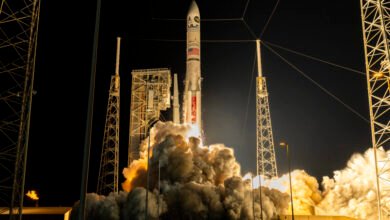Stoke Space’s $510M Round Signals Defense-Focused Launch Future

▼ Summary
– Stoke Space raised $510 million in a Series D round led by USIT, a fund focused on national security technologies, signaling a shift in the launch industry’s priorities.
– The launch industry’s focus has moved from commercial payloads to defense, driven by geopolitical tensions and U.S. government initiatives like the “Golden Dome” missile defense project.
– Only SpaceX has consistently launched commercial payloads cheaply and reliably, while other startups previously emphasized visions of large commercial markets that have not materialized.
– Launch startups are now aligning their business models, investors, and language toward the U.S. government, with programs like NSSL Phase 3 offering billions in contracts over the next decade.
– Investments in companies like Stoke Space and acquisitions such as Firefly’s purchase of SciTec highlight the growing emphasis on national security capabilities in the space industry.
A recent $510 million funding round for Stoke Space, spearheaded by a national security-focused investment fund, signals a profound transformation within the launch industry. The center of gravity for launch demand has shifted decisively from commercial markets toward defense and national security priorities. This substantial capital infusion, led by Thomas Tull’s U.S. Innovative Technology fund, highlights a strategic realignment where government contracts are becoming the primary target for a new generation of aerospace companies.
Just a few years back, the narrative for space startups was built on capturing a booming commercial market. Companies like Astra and Relativity Space painted visions of hundreds of annual launches to serve constellations for broadband, weather, and Earth observation. The underlying promise was that technological advances would drastically lower costs, unlocking vast commercial demand. However, the reality has been more challenging. The number of available commercial payloads is finite, and only SpaceX has consistently demonstrated the ability to launch them both affordably and reliably.
In stark contrast, the defense sector is experiencing a powerful surge. Geopolitical events, including the conflict in Ukraine and intensified space competition with China, have created strong tailwinds. The Pentagon’s multi-billion-dollar “Golden Dome” initiative, aimed at establishing a sophisticated missile defense shield, is pouring enormous funding into the aerospace sector. Programs like the Space Force’s National Security Space Launch and the Space Development Agency’s satellite constellations promise years of predictable, high-value government contracts.
Launch startups have taken clear notice of this shift. Their business models, investor presentations, and strategic language are increasingly tailored to a single, dominant customer: the U.S. government. Stoke Space’s own announcement regarding the new funding emphasized its role in strengthening the “capability across the U.S. space industrial base.” The participation of other investors, such as Washington Harbour Partners and General Innovation Capital Partners, further underscores the company’s perceived importance to national security.
Recent contract awards validate this strategic pivot. In March, Stoke was selected for the NSSL Phase 3 Lane 1 program, making it eligible to compete for launch contracts worth up to $5.6 billion over the coming decade. Other industry moves tell a similar story. Firefly Aerospace’s $855 million acquisition of SciTec was explicitly framed as a move to enhance its capacity for defense missions. Similarly, Relativity Space’s new owner, former Google CEO Eric Schmidt, has publicly warned about the strategic imperative of maintaining U.S. leadership in critical technologies like AI and space, reflecting a sector-wide sentiment that America cannot afford to fall behind.
The choice of U.S. Innovative Technology as the lead investor is particularly telling. Thomas Tull established the fund specifically to back technologies “relevant to the national interest,” with a portfolio that includes defense-focused firms like Shield AI and Gecko Robotics. Stoke’s inclusion in this group solidifies a new market reality: significant space investment now resides squarely at the intersection of venture capital and defense budgets. The future of launch is being written not just for commercial customers, but for national security.
(Source: TechCrunch)


